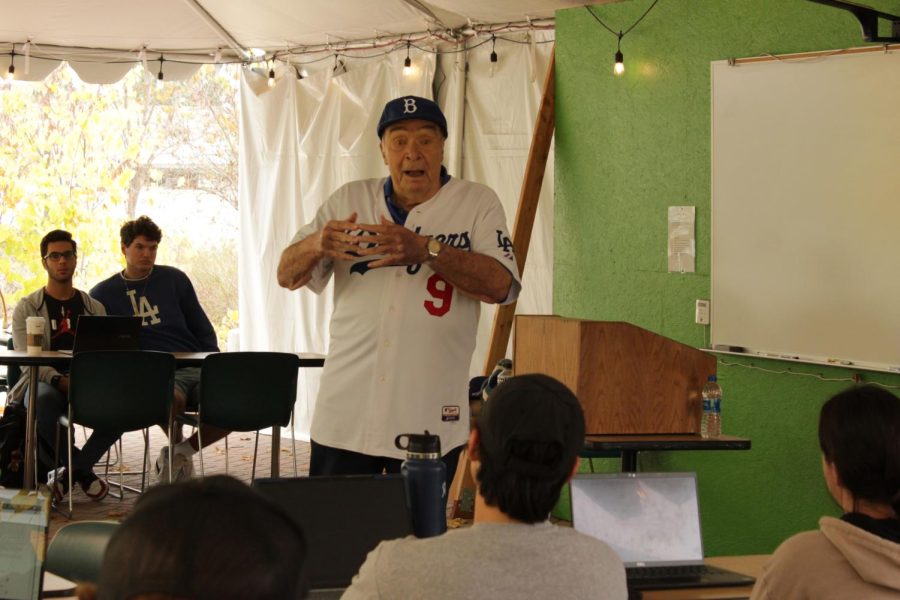From Classical pianist to the major leagues: Alfred Ferrara shares his journey with Cal Lutheran students
Photo by Noah Morrow - Reporter
The former LA Dodger is a two-time World Series Champion.
November 8, 2022
Former outfielder and pinch hitter Alfred “The Bull” Ferrara, spoke to California Lutheran University students about his experience in the major leagues—witnessing historic moments in baseball before and during playing professional baseball.
The now community relations specialist for the Los Angeles Dodgers started playing baseball on concrete with cars and sewer caps as bases, and went on to debut in the major leagues in 1963 and continue his career until 1971 when he retired. After watching the Brooklyn Dodgers play in their white uniforms on the stadium grass field, Ferrara said he thought playing baseball was something he wanted to do.
“You know what, I am going to do it. No matter what it takes for me to do it, I am going to be a professional major league baseball player,” Ferrara said.
One thing Ferrara said he learned from his experiences is to always have a second choice.
“Always give yourself a second choice in anything that you do. So [if] you aren’t able to fulfill your first dream, there’s a second, third or fourth dreams you can go on,” Ferrara said.
Not only did this first baseball game solidify Ferrara’s dream, it was the first game Jackie Robinson, the first African American to play in the major leagues, played in 1947.
“He was there and I happened [to be] right there that same game for my first game to watch this wonderful guy, not only a great baseball player, but a fantastic activist,” Ferrara said.
Robinson, according to the Jackie Robinson Foundation, was court-martialed and honorably discharged from the U.S. Army for “standing up for his rights and refusing to move to the back of a segregated military bus,” and later became a leader in the civil rights movement.
Ferrara said Robinson was a fighter but had to control himself so he wouldn’t be labeled a troublemaker, since he didn’t want the Brooklyn Dodgers to trade him or drop him.
Despite Robinson’s actions breaking the race barriers in baseball, Ferrara said the world’s racism continued the way it was, since his Black and African American teammates would still be denied entrance to certain establishments.
“He could take me to his town, but I could not take him to mine,” Ferrara said.
While in Florida, Ferrara said a teammate was turned down from eating at a restaurant because of the color of his skin.
“I’ll never forget that look in those eyes. They carried me through my life,” Ferrara said.
Visiting Lecturer Judy Battaglia said sometimes being taught by a professional with expertise instead of a lecturer with a scholarly background can be a bonus to an educational environment and can diversify pedagogies.
“There is a power in telling stories, especially stories of marginalized individuals,” Battaglia said. “We think that things such as slavery, Jim Crow and the Holocaust were so long ago, but as we are talking about epigenetic trauma, it can last throughout generations.”
Additionally, Battaglia said healing can also last throughout generations, which was what she wanted students to learn from Ferrara’s speech.
“Being able to listen to someone with a lot of knowledge is so great because it provides me with a different perspective,” junior Harrison Dunkel said. “After hearing Al, I want to communicate with my old coaches and old family members to pick their brains and hear their stories.”
Dunkel said it was remarkable to listen to what Ferrara went through, especially during the civil rights movement.
“Being able to hear about someone’s personal stories during the time is eye-opening because we don’t really think about that since it wasn’t really in our lifetime,” Dunkel said.
Ferrara said Marvin Miller challenged the reserve clause embedded in baseball players’ contracts and changed everything by helping the players gain free agency. He also said Miller’s contributions made it better for the next generations and gave the baseball players today an opportunity to receive their share of the money cable television receives for their playing.
“It’s more than a game. Baseball players always have a personal impact in the world around baseball and I think a lot of people would benefit from knowing how Al’s mentality was shaped by the sport,” Dunkel said.



